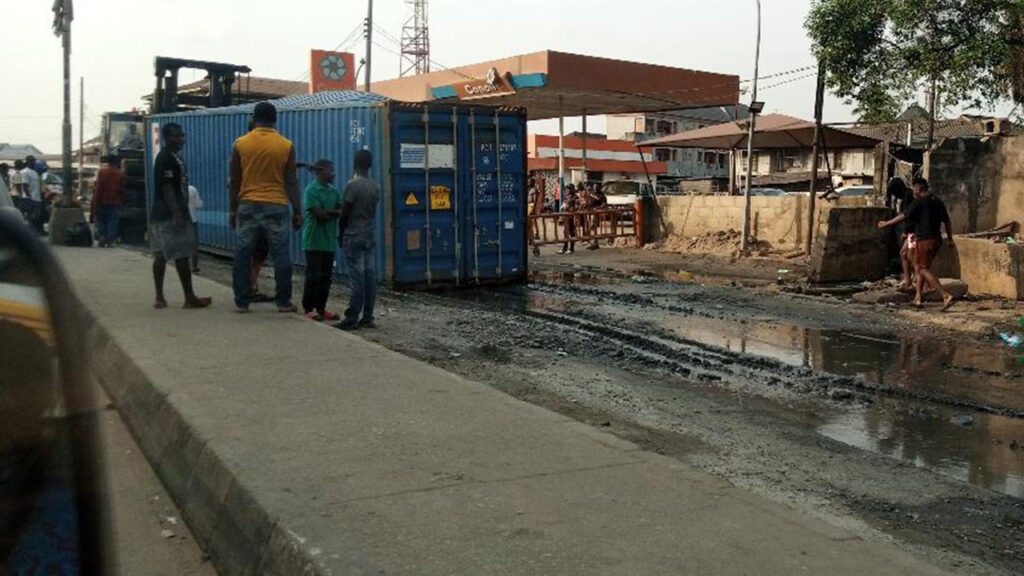
Many Nigerians, including businesses, rely on road transportation to move their goods from one part of the country to another. Despite being the major means of transportation especially for businesses, most of the country’s roads are in parlous state. They are either not accessible or filled with different sizes of potholes and craters. These have raised dire consequences for businesses across Nigeria writes GBENGA SALAU.
On January 3, 2024 a truck upturned while trying to navigate through the multiple potholes on Agege Motor Road in Mushin area of Lagos. The incident happened in the day time.
From eyewitness account, the driver was not on speed, the accident occurred because the truck driver did not understand the terrain. He had driven into one of the big potholes within the corridor uninformed. As a result, the truck carrying a container tilted and eventually fell.
Sometime, in June 2022, one person was injured when a truck laden with a 20-ft container fell in Lagos. The incident happened around the rail crossing in Yaba when an articulated truck was trying to navigate a bad portion of the road.
In its account of the incident, the Lagos State Emergency Management Agency (LASEMA) said: “Upon arrival at the incident scene, an articulated truck laden with a 20ft container was found accidented at the railway crossing at the aforementioned location.”
The Permanent Secretary of LASEMA, Dr Olufemi Oke-Osanyintolu, in an update on the incident, said further investigation “revealed that the truck driver poorly navigated the bad sections of the road and as a result, the truck overturned onto the rail tracks.”
Accidents like this are not limited to Lagos. There are many occurrences across Nigeria, where businesses and transporters suffer from the bad state of the roads in the country. In some instances, robbers also use bad spots on roads as places to waylay articulated vehicles to divert such vehicles to steal the goods being conveyed.
And the Director General of the Manufacturers Association of Nigeria (MAN), Mr. Segun Ajayi-Kadir, in a chat with The Guardian, disclosed that such mishaps are daily occurrences all over Nigeria with dire consequences on businesses, especially manufacturers.
Data has it that about 90 per cent of goods and people in Nigeria are moved by road, so, road transportation dominates other modes of transport like rail, air and water.
This implies road are essential in the facilitation of movement and trade across the country. Ironically, most of the roads in the country are in deplorable state as they are dotted with varied sizes of potholes and gullies.
The resultant effect is the damage to not just vehicles, but also goods being conveyed by the articulated vehicles, leading to increase distribution, production and product costs as well as downtime in meeting supplies and consumers’ demands.
From North to West, East and South of the country, there are several dreadful roads inflicting pains on businesses, their managers and economic activities generally that roads were meant to aid.
From the bypass in Benin, Edo State connecting the Sapele Road to Upper Sokponba Road, Agbor Road, and the Benin-Auchi Road terminating at the Benin-Lagos Expressway, all within the south-south region of the country are in terrible state.

Also, the Benin-Auchi-Okenne-Lokoja Highway is in poor state with section from Urokuosa community near Benin City to Ewu, in Edo Central most hit, while the Okpella to Okene road in Kogi State, the story is not any better.
Similarly, the Enugu-Port Harcourt Expressway, Lagos-Badagry-Seme Expressway, East-West Road, North-East Link Road, Ekpoma-Abuja Highway, Jos/Bauchi/Gombe Road, Kabba, Ayetoro Gbede, Egbe -Ilorin Road, Lagos /Abeokuta Expressway, Jos-Kaduna Road, Itokin/Ikorodu Road, Keffi-Nasarawa-Borno Road, Abuja-Lambata-Bida Road, Calabar – Itu- Road are just a few of the major roads expected to make possible intra and inter-trade in Nigeria, but these roads are a pain in the neck for businesses and their management, because of the awful state of the roads.
The Minister of Works, David Umahi, recently captured the dreadful state of Nigerian roads after taking a tour around the country to have firsthand information about the state of federal roads.
Hear him: “On the whole, to address our road sector for the next four years, we would need about N18.6 trillion, and so, the National Assembly must have to wear its thinking cap on how we can address seriously our road sector.
“When you ask me to go and intervene on certain roads, which have collapsed, and I have to liken the situation to a man on life support. The man needs immediate attention. Where there is an emergency, the road is cut and the people are suffering, movement is stopped, it needs an emergency. So, we appeal for contingency to respect your directives on fixing emergency situations.”
Umahi pointed out that some roads are riddled with not just potholes but ‘boreholes’. He was also dismayed at how contractors cheat Nigerians with the materials being deployed for the construction of roads across the country.
He observed that: “There is no project being constructed right now in Nigeria that is going to last for seven years. The question is: Are we going to be maintaining or reconstructing our roads every 10 years?
“That is what we have been doing. I travelled from Abuja to Benin City through Lokoja, all the stretches of the road are on contract, and ongoing, this is through the policy of the last administration but how much of the roads are motorable?
“I travelled through the roads myself and I shed tears for the kind of pain our people are going through. I spent 14 hours on the road having started my journey at 10:00am and got to Benin City at 2:00pm the next day and I was very happy I experienced the pains.
“Unless the President does something about our procurement, his lofty intention to help this country may not be achieved. Documents will be sent to the Bureau of Public Procurement for a no-objection certificate and it will stay for six months. How will the contractors do the additional job you directed them to do without backup authorisation.”
And business concerns that suffer from the horrible state of roads across the country include small, medium and large organisations. These businesses include transporters, importers, exporters, manufacturers, haulage companies, marketers as well as farmers to mention a few.
Although the minister of works gave an account of the dilapidated condition of federal roads across the state, the deplorable nature of roads in the country is, however, not limited to just the federal roads. Many of the state and council roads across Nigeria are not better managed compared with the Federal roads.
Of note is that Nigeria’s road network and infrastructure across the six geopolitical zones is estimated to be about 200,000km in length of which 18 per cent are said to belong to the Federal Government, that is about 36,000km, while state governments superintend about 16 per cent of the country’s roads put at 32,000km, just as 66 per cent of the nation’s roads are managed by the local government, estimated to be 132,000km.
Sharing his experience about plying Nigerian roads, a truck driver, Ariyo Babatunde, said driving at night is even more precarious for many truck drivers, as most of the roads are not properly illuminated with streetlights, so many drivers run into potholes and gullies that naturally upturns articulated vehicles.
Providing insight on how bad roads across the country have consequences on their operations, the National Coordinator, 100 per cent Compliance Team of the National Association of Government Approved Freight Forwarders (NAGAFF), Ibrahim Tanko, said the deplorable state of the roads across the country is negatively affecting not just citizens, but also businesses. According to him, it hampers the ability to connect one part of the country with another smoothly.
“For instance, the Ilorin-Jebba Road has been in a very bad state for a very long time now and we have been talking about it, including complaining to the various authorities about it, but nothing has been done to fix it.
“And almost every day, trailers fall on that road with cost implication for both the transporters and owners of the goods. In fact, if there is anything this government should do for us, it is to find solution to the insecurity crisis and fix the bad roads. If they succeed in this, 80 per cent of our problems are solved.”
Giving a better context and explanation, Tanko further said when a truck leaves Lagos for Kano or Abuja, instead of the driver spending four to five days to complete the journey; he could end up spending between two to three weeks on the trip principally owing to bad roads.
“Sometimes, some of the trucks fall and get damaged, including the goods on the truck with the importer losing the consignment, while the transporters bear the brunt of the damaged truck. Lots are lost in the process. Look at the roads within the Benin axis; it is a serious issue with both the transporters and importers losing a lot.”
On his part, the Chairman, Association of Maritime Truck Owners, Remi Ogungbemi, said it is just unfortunate that there are so many bad roads in Nigeria.
“And I do not know why it is like that. Even the road that leads to the gateway to the economy of our nation, the ports, are terribly bad. Just of recent, some palliatives were done on one or two of the roads.
“We even had a meeting with the Controller of Works, Lagos, on it recently, drawing her attention to see reason to rehabilitate the roads. She promised to look into it though premised on getting approval from Abuja because without the approval from Abuja, there is nothing she can do.
“However, the conditions of the roads are very bad and it is one of the reasons most of the trucks are in rickety and dilapidated conditions. The fact remains that the bad roads bring about rickety and bad shape of the trucks. The trucks that are falling across the highways in the various parts of the country are because in almost every area, there are appalling roads.
“I do not know nor understand why government decided to just neglect the roads, may be because most of our leaders do not use the roads to connect one part of the country with another, as they usually use the air means of transportation. May be that is why they decided to abandon the roads. And it is not good, because it is affecting not just transporters, but also the economy.”
Asked to provide an estimate of the number of times that trucks get upturned monthly, Ogungbemi disclosed that as a union they had not taken time to take statistics, but like the Director General of the Manufacturers Association of Nigeria (MAN), he said trucks upturning and getting stuck in bad roads is almost a daily occurrence across the country’s highways and roads.
“Trucks are falling into ditches daily and it is an eyesore that it is happening in almost every part of the country. We can only appeal to the authorities to at least see that they maintain these roads. I am even surprised that some roads would have minimal potholes, but rather than fix and patch them, the government and its agencies will abandon it and wait till the potholes become craters that would cost more money and time to fix before deciding to look into repairing such road after much cry from the populace.
“It is affecting us negatively, so, we are calling on government to see how they can embark on serious road rehabilitation across the country. Also, while government agencies often stop vehicles, and sometimes, impound vehicles for not having road-worthiness certification or not being road worthy, who holds governments accountable for the many bad roads across the country that is not vehicle worthy?” Ogungbemi asked.
In the same vein, commenting on the negative implications of bad roads for businesses, the Director General of Manufacturers Association of Nigeria said that sometimes consignments are lost to accident on the way to being delivered to the wholesalers due to dilapidated roads.
“And even some of our raw materials, especially those being moved from remote areas to the factories, they suffer the same fate in some cases because of the breakdown of the trucks. And the perishable goods, we lose the raw materials, when the vehicle conveying them upturned.
“Very importantly, the cost of moving goods because of the bad road is also a major concern which affects the prices of products, sometimes leading to consumers’ apathy. Thus, we are not able to sell as we should. This is because when we put the cost on our end product, the price becomes higher.
“Furthermore, it compounds insecurity. If the roads are in good state and safe, there would not be slowing down in many spots that robbers easily accost trucks on the road with the intent to divert them and steal the consignment.
“All these are seen as cost, because it puts demand on time, resources and production process.” With roads dominating the means of commuting and moving goods, no doubt, there is a need to rethink the process of moving goods across the country considering there are other modes of transportation.
And the DG of MAN agreed, calling on the government to reduce the pressure on roads by considering seriously extending the rail network.
“This is because with rail you can transport more cargo better and cheaper. The cost of diesel has worsened the matter. Food inflation is also linked to the state of the road.”
Ajayi-Kadir also could not provide an exact estimate of what businesses lose to bad roads yearly but guess it runs into billions of naira. Speaking, Dr Madu Obiora, an expert on haulage activities, could also not provide statistics or estimates to what is being lost to bad roads by businesses, saying “It is very difficult to get the figure, but the fact is that it is massive, a whole lot and these things are causing supply chain disruption.
“Raw materials that are heading to factories either cannot get or get there late and the factory will have to stop production because it did not arrive. The losses are not only financial.”
Pressed to give a clue in naira and kobo of the likely loses businesses suffer, quoting a report in one of the national dailies, he said stakeholders disclosed that Nigeria is losing about $8.1 billion, which is about N3.6trn to poor infrastructure, inefficiency and corruption at the seaport.
He, however, put a caveat that he cannot vow for the figures, but it gives an idea of the kind of challenges businesses face. Obiora, however, supported the statistics that revealed that most of the transportation of goods and persons are done through road, maintaining it is not good development.
“And this is why Nigerian products are not competitive abroad, that is why the manufacturing sector is dying. The non-competitiveness of our economy is as a result of poor logistic infrastructure and until we fixed it, we would have a lot of issues to grapple with.
“Look at those that are running logistic business, you buy a new vehicle, after a short while, the vehicle is gone, you have to replace it. Of course, foreign exchange rate is escalating on a daily basis”
If you see anybody running business, especially logistic business, doff your hat for the person, it is not easy, because Nigeria is one of the most difficult places you can run logistic services.” Obiora, nonetheless, maintained that though businesses bear the burden of bad roads, but they pass some of the cost to the consumers.
“At the end of the day, the cost is added on, because the person has to remain in business and the consumers bear the brunt. Look at the cost of things in the market, how many manufacturing company lines have shutdown.
“In navigating the bad road, the trucks might be forced to take a longer route and as you take a longer route, you are burning diesel. “I remember speaking to the chief executive of a major manufacturing company that was here years back when we were doing impact analysis on export expansion grant. And he told me, he actually showed me the figures, two of his factories are not connected to the national grid, which means 24 hours the factories were on generator because of the sensitivity of the machines. And he said then that if nothing happens, end is in sight and five years later, the company left but the company’s importation arm is still in Ijora.”
On her part, the Director General of the Lagos Chamber of Commerce and Industry (LCCI), Dr Chinyere Almona, said LCCI is deeply concerned about the ongoing challenges faced by businesses in Nigeria, particularly, those operating in the logistics and transportation sector.
“We have been made aware of the specific issues raised by a leading player in the sector with an established footprint in Nigeria’s economic landscape over many decades.
“Stakeholders in the logistics and transportation sector serve major national and multinational companies and play a critical role in ensuring the smooth movement of goods across the country. These players and the companies they serve experience grave difficulties, which impact the overall cost of doing business.
“One of the key issues highlighted by transporters is the alarming delays experienced by their drivers on federal highways due to the dilapidation of the road network, which, in turn, adversely affects their cash flow, increases maintenance costs in addition to the impact of foreign exchange volatility on imported spare parts and tires.
“These challenges, combined with a lack of a clear government strategy to support businesses in the sector, have far-reaching consequences for the overall economic landscape.
“The impact extends across the business community as the survival of companies is intricately linked to the efficient and timely transportation of their products, and any disruptions in this supply chain have a ripple effect on their operations, the businesses they support, and ultimately the consumers.”
She, therefore, called on government to urgently address these challenges and engage in a constructive dialogue with stakeholders in the logistics and transportation sector.
“A clear and comprehensive strategy is needed to streamline operations on federal highways, address the volatility in foreign exchange, and foster an environment conducive to business growth,” Almona stated.













